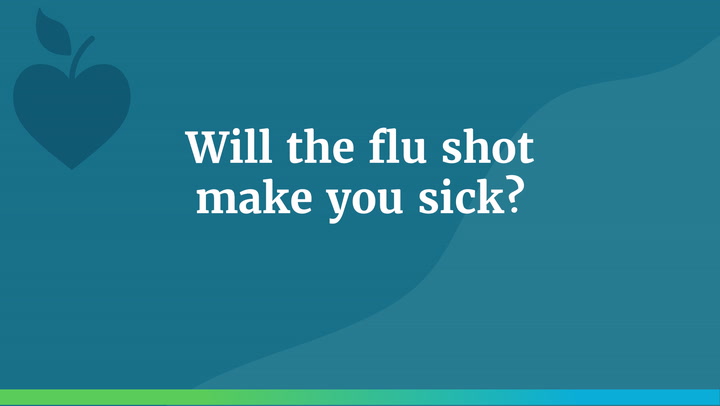The Facts on Flu Shot Side Effects and Risks
Concerns about side effects, allergic reactions, and a rare immune disorder associated with the flu shot are keeping some people from getting vaccinated.


In the United States, medical organizations — from the American Medical Association to the American Academy of Family Physicians to the American Hospital Association — almost universally recommend the flu vaccine to everyone over the age of 6 months.
Yet only about half of American adults get an annual flu vaccine, according to the Centers for Disease Control and Prevention (CDC). Even last year, when health officials and doctors sounded the alarm about a potential “twindemic” of influenza and COVID-19, just 50 to 55 percent of adults got a flu shot, according to the CDC’s preliminary estimates.
Among the reasons that people don’t get vaccinated for the flu is an unfounded fear that the shot might actually give them the flu, says Jennifer Horney, PhD, director of the epidemiology program at the University of Delaware in Newark.
“This is a widespread myth,” she says. “While some vaccines — for example, the chicken pox vaccine — contain a weakened live virus to stimulate an immune response, the influenza vaccine [with the exception of the nasal spray form] is an inactivated vaccine made with viruses that have been killed and are therefore not infectious.”
Though the nasal mist version of the flu vaccine does contain live viruses, they are so weakened (attenuated) that the spray form will not cause illness, states the CDC.
Will the Flu Shot Make You Sick?

Side Effects of the Flu Shot Are Nothing Compared With Flu Sickness
Many people are also concerned that the possible side effects of the flu shot could be worse than getting the flu itself, notes Horney.
“The potential risks of a severe case of influenza far outweigh any very limited risk of side effects [from the vaccine], which are typically mild,” she says.
Some people equate the flu with having a bad cold. While the flu and the common cold have some symptoms in common, the flu can knock people flat for a few days to as long as two weeks, and it can also have far more dire consequences.
Some people who get the flu will develop complications such as pneumonia, inflammation of the heart (myocarditis), inflammation of the brain (encephalitis), or respiratory failure, which can lead to hospitalization and death, notes the CDC.
“Even if you’ve been vaccinated and still get the flu, you are less likely to die, be hospitalized, or be admitted to the ICU,” Horney says.
While incidence of the flu was unusually low last year, thanks to COVID-19 precautions like mandatory masking and stay-at-home orders, the CDC estimates that the 2019–2020 flu season led to some 400,000 hospitalizations and 22,000 flu deaths.
And we could potentially see numbers like that again this year. As people return to offices and classrooms, and COVID-19 vaccinations lead to more mask-free gatherings, doctors are expecting a major uptick in flu cases this fall and winter.
Indeed, reduced population immunity (due to a lack of exposure to the flu last year) could result in an early, and possibly severe, flu season, cautions the CDC.
RELATED: Will We Be Walloped by Flu Season This Year?
What Are the Main Side Effects of the Flu Shot?
The CDC lists the following common side effects that people may experience from getting a flu shot:
- Soreness, redness, or swelling where the shot was given
- Headache
- Fever
- Nausea
- Muscle aches
If these reactions occur, they usually begin soon after vaccination and last one to two days.
“You can have a sore arm, feel a little achy for a day or two, and maybe have a low-grade fever as your immune system gets turned on,” says James Conway, MD, a pediatric infectious disease specialist at the University of Wisconsin School of Medicine and Public Health in Madison.
“If so, take some Tylenol or some ibuprofen and ride it out — it’s a small inconvenience and certainly well worth the protection from what could be a potentially devastating disease,” he adds.
Another occasional reaction to be aware of is fainting; a handful of people may temporarily lose consciousness after getting any type of vaccination.
RELATED: Get a Flu Shot Now or Wait?
7 Flu Shot Myths You Should Stop Believing
Can People Have an Allergic Reaction to the Flu Shot?
A flu immunization may produce an allergic reaction, but instances of this are very rare, and effective treatments can quickly resolve any trouble.
Most vaccines are developed from chicken eggs. The CDC cautions that people who have a history of a severe egg allergy (usually meaning symptoms other than hives after exposure to an egg) should be vaccinated in a medical setting, supervised by a healthcare provider who is able to recognize and manage severe allergic reactions.
Two completely egg-free flu vaccine options are now widely available — the quadrivalent recombinant vaccine and the quadrivalent cell-based vaccine.
RELATED: Where to Get a Flu Shot
Should People Who Are Immunocompromised Get a Flu Shot?
Another misconception is that individuals with chronic conditions who may be immunocompromised may have a worse reaction to the vaccine because they are more vulnerable. Health officials say this is not so.
“When we say that the vaccine is universally recommended for ages 6 months and above, we mean it,” says Dr. Conway. “The only group that should absolutely not get it again would be somebody with a genuine allergic reaction to the vaccine — obviously, they should avoid it.”
“Older people and people with underlying conditions should really even be higher priority than others to get the flu vaccine,” says Dean Winslow, MD, an infectious disease specialist and professor of medicine at Stanford University School of Medicine in California.
The fact is, the flu can be much more disastrous for these high-risk populations.
People with asthma, heart disease, diabetes, and a number of other chronic health conditions are at a higher risk of developing serious flu complications that can result in hospitalization or even death, per the CDC.
Indeed, during recent flu seasons, 9 out of 10 people hospitalized with the flu had at least one underlying health condition, the agency notes.
Being pregnant also puts you at an increased risk of more severe illness from the flu. This is due to changes in the immune system, heart, and lungs that occur during pregnancy (and last up to two weeks postpartum).
“We definitely recommend as a general rule that all pregnant women should be vaccinated,” says Dr. Winslow. “There’s no risk to the mother or the fetus.” He adds, “Some pregnant women who have contracted the flu have been severely affected and died.”
The flu vaccine offers protection against the flu to both the mother and the baby.
Rita Wilson on Her Journey from COVID-19 Patient to Flu-Vaccine Advocate

Can the Flu Shot Trigger a Harmful Immune Reaction?
Although it’s an extremely uncommon reaction to the flu vaccine, a very small number of individuals may develop Guillain-Barré syndrome (GBS), a rare disorder in which the body’s immune system attacks nerve cells, causing muscle weakness and sometimes paralysis.
The CDC estimates that the risk of GBS after vaccination is fewer than 1 or 2 cases per million people vaccinated.
“It’s incredibly rare, so it’s not something that I worry about,” says Ann Philbrick, PharmD, an associate professor at the University of Minnesota’s College of Pharmacy in Minneapolis. “But it can be a paralyzing disease, so it is certainly something severe enough to mention.”
The Mayo Clinic notes that most people recover from GBS, and several treatments can ease symptoms and reduce the duration of the illness. The mortality rate is between 4 and 7 percent.
GBS can also occur after illness from the flu itself, the CDC notes. And, although it is also very rare, GBS is more common following flu illness than flu vaccination.
Ultimately, the potential side effects of a flu shot are nothing compared with the damage the virus itself can inflict.
“Respiratory viruses like flu and COVID can really do a number on society,” says Conway. “Anything we can do to maintain community immunity and prevent any unnecessary death and destruction is really important.”
Additional reporting by Julia Califano.



